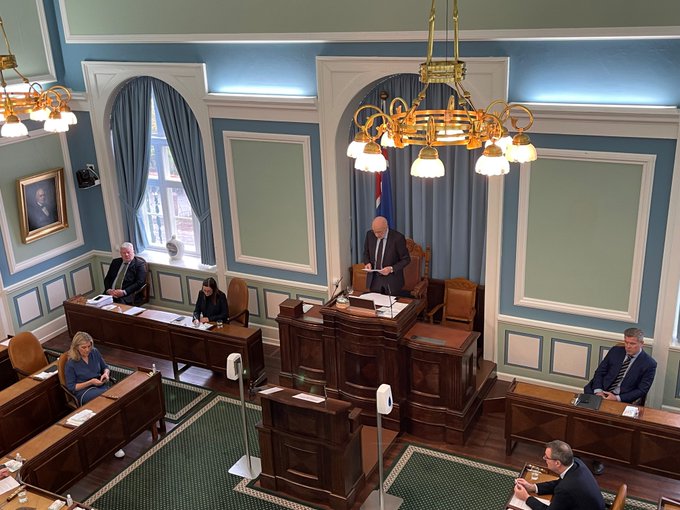Top photo: Iceland’s parliament holds a session on June 7, 2021, in Reykjavík. (Photo: Alþingi / Twitter)
Welcome to Factal Forecast, a look at the week’s biggest stories and what they mean from the editors at Factal. We publish our forward-looking note each Thursday to help you get a jump-start on the week ahead. If you like what you see, you can subscribe for free.
A look ahead:
Sept. 25/ Icelandic parliamentary elections: Iceland will vote Saturday to elect a new parliament four years after three parties formed a coalition in the small European nation.
- What’s happened so far: Back in 2017, Iceland held snap elections after the previous government collapsed. After a close vote, three parties — the Left-Green Movement, the Progressive Party and the Independence Party — formed a coalition government. This year, nine main parties are campaigning to fill the 63 seats in Iceland’s Alþingi with issues such as healthcare, the economy and the environment as the main focus of the election.
- The impact: Recent polls suggest all nine of the main parties could win at least one seat in the country’s parliament, with the Independence Party and the Progressive Party expected to win the majority. This means Prime Minister Katrín Jakobsdóttir’s Left-Green Movement is likely to lose its majority. Analysts, however, have suggested the final days of campaigning could swing the vote, particularly after the last debate set for Friday.
Sept. 25/ Tunisia protests: Opposition is mounting against Tunisian President Kais Saied after he extended indefinitely the “exceptional measures” he took in July that effectively consolidated all power in his hands. Protesters are planning to hold rallies Saturday after the first major demonstration took place in Tunis last week.
- What’s happened so far: President Saied suspended parliament, fired the prime minister and imposed house arrest on dozens of politicians under the guise of fighting corruption and overcoming the economic and political dysfunction that have plagued Tunisia since the 2011 uprising that initiated the so-called Arab Spring. On Wednesday, he extended the halting of parliament and granted himself even more powers, including writing laws for “political reform” and ignoring constitutional articles that contradict his actions.
- The impact: Saied, and his relationship with the country’s military, is now being tested by popular discontent that has mostly been absent since his seizure of power. Unlike other North African countries that experienced unrest, Tunisian security forces have so far used non-lethal means to contain demonstrations. The size of this Saturday’s protest could pressure Saied to speed up his transition, or embolden him to take more unilateral actions if turnout is perceived to reflect continued weak opposition.
Sept. 25/ The Netherlands eases coronavirus restrictions: Most social distancing measures will be dropped in the Netherlands starting Saturday, as the country moves to a “health pass” system requiring proof of vaccination for entry into various venues.
- What’s happened so far: Dutch Prime Minister Mark Rutte announced last week the decision to require bar and restaurant patrons, as well as those attending cultural events, to be fully vaccinated, following similar mandates in several other European countries. Dutch opposition figures, however, have criticized the idea of linking access to vaccination status, claiming the requirement essentially makes the shots mandatory for all. As of Sept. 19, just shy of 80 percent of people ages 12 and older were considered fully vaccinated, while 86 percent of those over the age of 18 had received at least one dose.
- The impact: Health Minister Hugo de Jonge said the use of the vaccination “health pass” will be “as temporary as possible,” but declined to give a firm end date. The onus on enforcement will fall on venues, with local officials in major cities like Amsterdam and Rotterdam saying they don’t have the manpower to keep close tabs on compliance. Protests have erupted in countries implementing similar mandates, and it is possible that the Netherlands will see similar unrest.
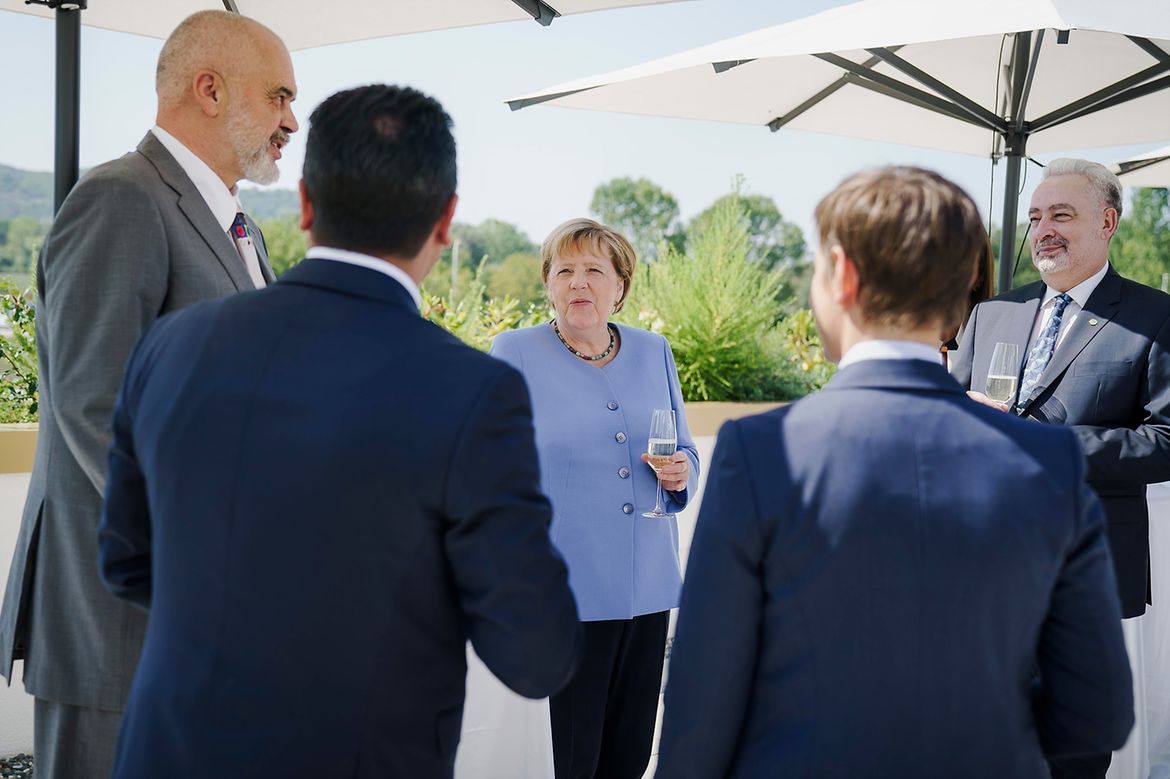
(Photo: German Federal Government / Denzel)
Sept. 26/ German federal elections: The race continues between Germany’s center-right’s Christian Democratic Union (CDU) and the center-left’s Social Democratic Party (SPD) in the final days before Germany’s election Sunday to decide a new chancellor to replace Angela Merkel after her 16 years in power.
- What’s happened so far: Merkel’s CDU suffered its worst result in more than 55 years in 2017 when the far-right Alternative for Germany party won 13 percent of the vote and entered the Bundestag. While the other parties vowed to not work with the anti-immigrant party after Sunday’s results, the CDU has again lost the advantage it held only a few weeks ago. The SPD currently leads the way with 25 percent, while the CDU holds a 22 percent share and the Greens only 16 percent. Annalena Baerbock, the Greens’ first-ever chancellor candidate, has pulled back significantly in the race after briefly leading in the polls back in May.
- The impact: Some pundits have predicted a coalition between the SPD, the Greens and the business-friendly Free Democratic Party (FDP) if SPD’s candidate, and Germany’s current finance minister and vice chancellor, maintains his lead. Others, however, are not convinced after FDP’s leader suggested he had little in common with the two parties other than the legalization of cannabis. If the CDU’s Armin Laschet tops the polls, many have predicted an alliance between the Greens, the FDP and the CDU.
Sept. 28/ North Korea convenes legislature: North Korea will hold a session of the Supreme People’s Assembly on Tuesday to discuss education and the national economic plan, according to state media.
- What’s happened so far: The Supreme People’s Assembly’s standing committee met in Pyongyang in August to set the session’s date and discussion items. The assembly is expected to address the country’s recent emphasis on ideological education for youth, rooting out non-socialist practices and a new economic development scheme focusing on self-reliance after fallout from sanctions and the coronavirus pandemic. The assembly will also discuss “organizational issues” following the recent reshuffle of top officials of the ruling Workers’ Party of Korea.
- The impact: Despite being North Korea’s top legislative body, the assembly does not practice independent decision-making but insteads generally rubber-stamps decisions made by the ruling party. Analysts say statements and state media reports from the session can often give clues on organizational shakeups, budgetary priorities and even foreign policy decisions. The assembly session comes at the heels of the country’s test of new long-range cruise missiles and South Korea’s development of its supersonic cruise missile.
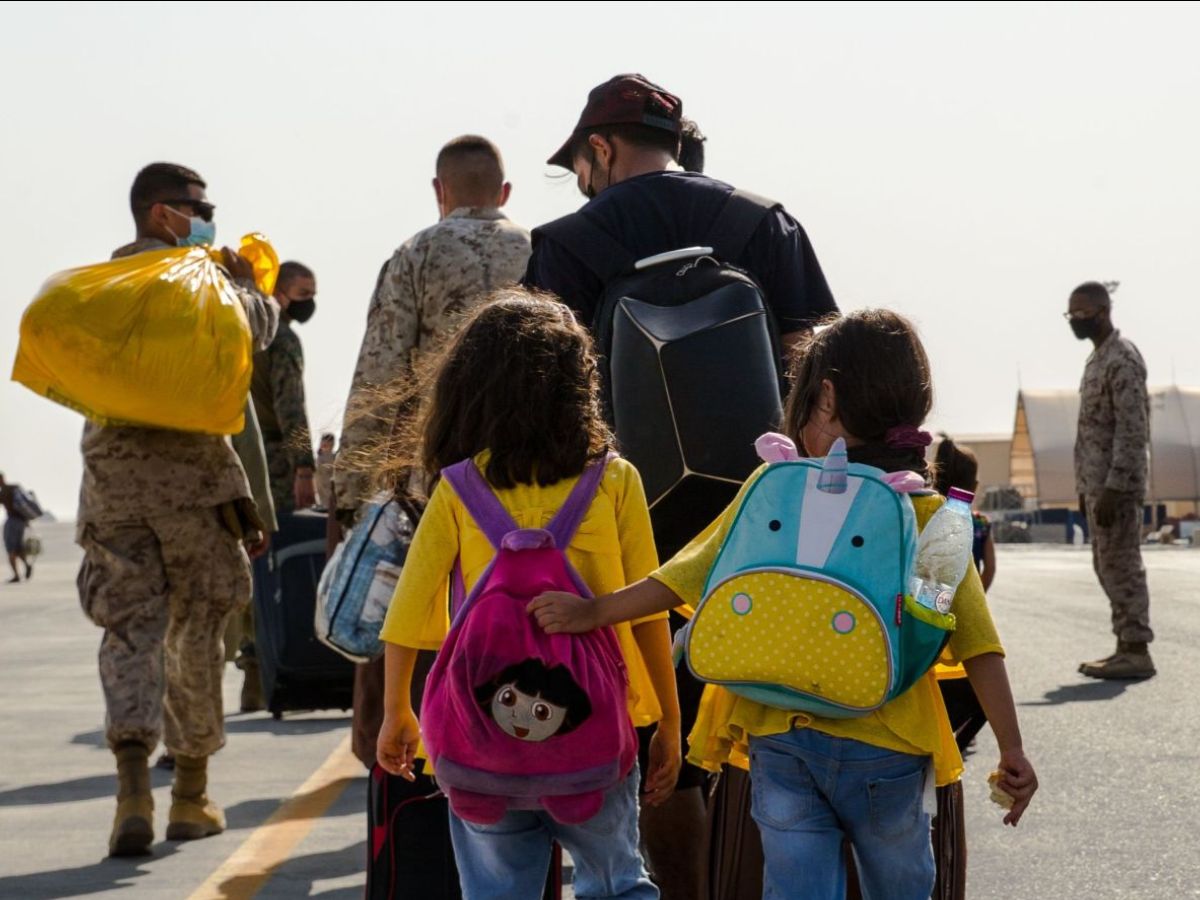
(Photo: U.S. Marine Corps/ Lance Cpl. Kyle Jia)
Sept. 28/ U.S. Senate panel hearing on Afghanistan: The U.S. Senate Armed Services Committee will begin hearing testimony Tuesday to examine the withdrawal of American forces from Afghanistan after more than 20 years of conflict.
- What’s happened so far: The oversight hearing comes amid heavy criticism on several aspects of the withdrawal, particularly over some allies who were left behind and the Aug. 29 drone strike in Kabul that killed 10 civilians. Defense Secretary Lloyd Austin, Chairman of the Joint Chiefs of Staff Gen. Mark Milley and Commander of U.S. Central Command Gen. Frank McKenzie are all expected to testify.
- The impact: While the committee’s first hearing on the withdrawal will surely see many important questions and answers on Afghanistan, it will also be the first chance for Republicans on the committee to question Gen. Milley under oath about some of his controversial actions during the end of the Trump administration. The committee is also expected to hold a hearing Thursday with outside experts as part of a review of U.S. military operations in Afghanistan.
Sept. 29/ Japan’s ruling party leadership elections: Four candidates have emerged to run for Japan’s ruling Liberal Democratic Party (LDP) leadership elections Wednesday, with its winner expected to become the country’s next prime minister.
- What’s happened so far: Current Prime Minister Yoshihide Suga has already withdrawn from seeking re-election as LDP president after only one year in office, due to poor approval ratings from his administration’s handling of the coronavirus pandemic and party losses in local elections. His term as party leader ends on Sept. 30, and he is expected to step down as prime minister after the party’s new head is chosen.
- The impact: With the LDP-led coalition holding a majority in the House of Representatives, the winner of the party leadership election is expected to become Japan’s next prime minister, and will lead the party into a general election to be held before the end of November.
Oct. 1/ Expo 2020 in Dubai: The coronavirus-delayed Expo 2020 world fair, set in Dubai, is set to open doors Friday to exhibitors from approximately 200 countries.
- What’s happened so far: The expo was initially set to begin in October 2020 but was delayed by a year due to the coronavirus pandemic. Now, with just a few days till the start date, the United Arab Emirates is reporting its fewest daily coronavirus cases in a year, prompting the easing of mask requirements in many public places. With nearly 25 million visits expected over six months, coronavirus vaccination certificates or proof of negative test will be required to enter the event.
- The impact: Through its theme “Connecting Minds and Creating the Future,” the expo aims to create space to discuss issues of climate change, conflict and economic growth. However, the expo faced controversy recently when the European Parliament urged its member states to boycott the event, citing “systematic persecution of human rights defenders, journalists, lawyers and teachers speaking up on political and human rights issues in the UAE.” Though Dubai officially expects 25 million visitors, travel restrictions will likely impact those projections.
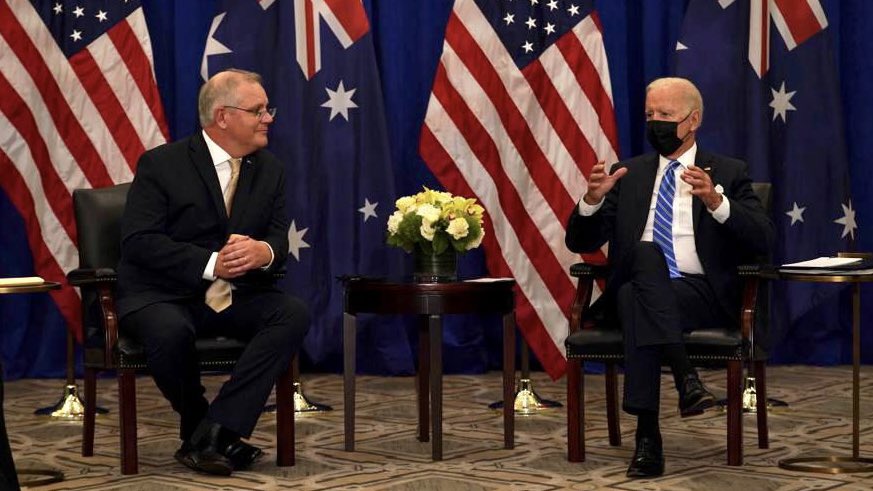
What else matters:
U.S.-U.K.-Australia security pact: In a move that sent ripples throughout Asia’s geopolitical landscape as well as the international arms industry, the United States, United Kingdom and Australia jointly announced a pact last week binding the three countries’ defense industries. Most notably, the pact, known as “AUKUS,” will assist Australia in its pursuit of nuclear-powered submarines in an effort to bolster Australia’s naval presence in the face of an increasingly assertive China. Such assistance is fairly unprecedented and goes to show the extent to which both Washington and Canberra perceive China as a threat. Only once before has the United States assisted a country in its pursuit of this sensitive technology: in the late-50’s with the U.K. Undersea warfare is one of China’s major weaknesses, and Australia’s decision to enrage Beijing with this procurement shows how much their bilateral ties have spiraled.
- Watch for: Australia’s Prime Minister Scott Morrison went to great lengths to make it clear that Australia will continue to not operate civil nuclear sites and is not seeking nuclear weapons as a Non-Proliferation Treaty (NPT) signatory. Regardless, the submarines and the conventional long-range strike capabilities that Canberra is seeking to equip them with are a significant addition to what is already a simmering arms race in the Asia-Pacific. The non-proliferation impacts also bear watching considering Australia will be exploiting a loophole in the NPT to operate nuclear-powered submarines running on weapons-grade fissile material without international safeguards. Other U.S. allies like Japan and South Korea could ask what differentiates them from Australia for such cooperation.The agreement also nullifies a preexisting deal for France to supply Australia with submarines, and Paris is not happy, taking the extraordinary measure of withdrawing its ambassadors from the United States and Australia.
U.S. border situation: A camp of thousands of mostly Haitian refugees has grown in recent days underneath a large bridge connecting Mexico and Del Rio, Texas. Haiti has seen a mass departure from the country following the assassination of President Jovenel Moïse in July and a deadly earthquake in August. The number of migrants under the bridge became untenable this month, leading to local officials requesting federal support. The United States has put many of the migrants on flights back to their homeland with plans to clear the camp by the end of the week.
- Watch for: The situation is politically charged from both sides of the aisle. Texas Gov. Greg Abbott blamed President Biden for the situation. The Biden Administration, meanwhile, is expelling the migrants without due process because of a policy put in place at the beginning of the pandemic. There have also been reports of Border Patrol agents whipping people from horseback and denigrating them. That has led to progressive Democrats like Rep. Ilhan Omar and Rep. Alexandria Ocasio-Cortez denouncing the actions of the Border Patrol.
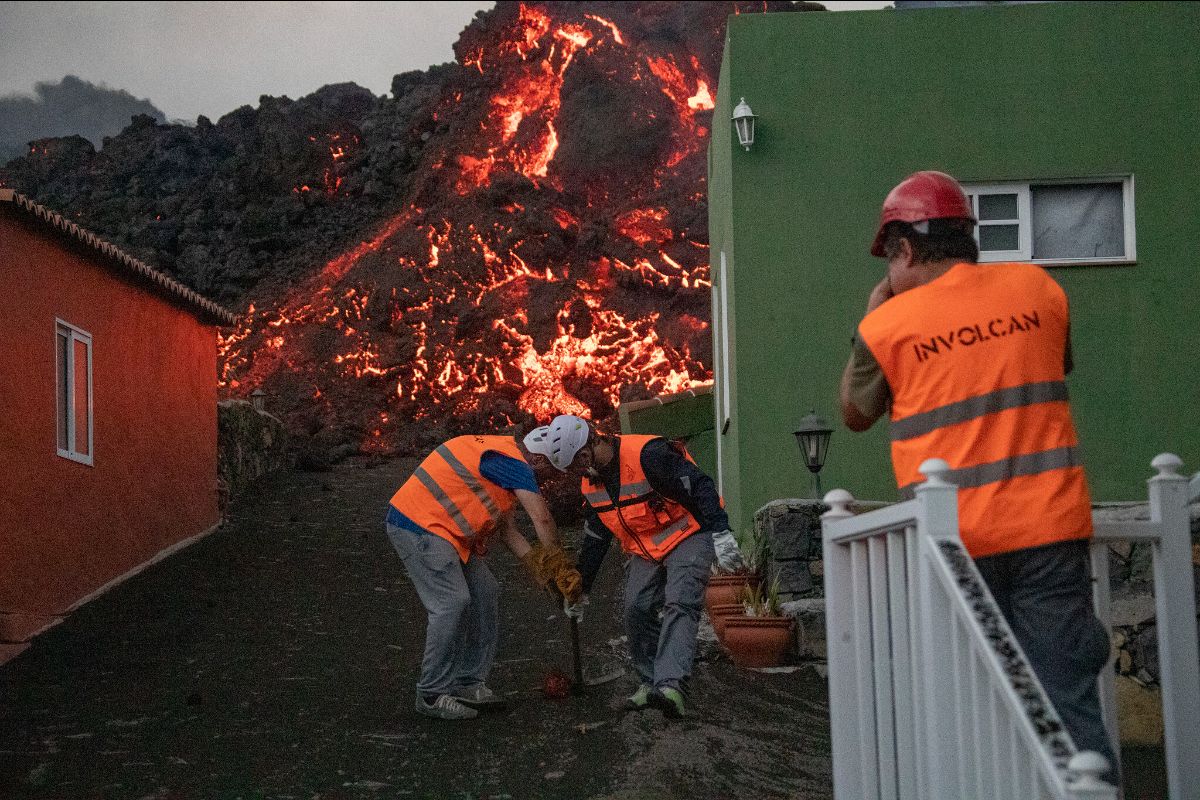
(Photo: Ministerio de Defensa de España)
Canary Islands volcano: On Sunday, an active volcano erupted in the Cumbre Vieja mountain range near the town of La Palma on Spain’s Canary Islands for the first time in 50 years. The magma has split into three flows that have so far destroyed an area of approximately 380 acres, razed 320 buildings and forced the displacement of around 6,000 people. In an efforts to fight the lava flows and prevent further damages, the government deployed military units to help firefighters redirect the flows as evacuations are extended to further areas. A sailing ban was pit in place Sunday around the island. Spanish Prime Minister Pedro Sanchez and the interior minister have visited the island, and King Felipe VI and Queen Letizia will do so later this week. On the other hand, the Council of Ministers is preparing to declare the catastrophic zone status in the area and the EU has announced an allocation of funds for recovery efforts.
- Watch for: EU scientists warned that a cloud of sulfur dioxide from the eruption will reach and likely cover the Iberian peninsula by the end of the week as they wait for the lava to reach the coast at a slower pace than originally forecasted. While the behaviour of the volcano cannot be predicted with accuracy, experts expect to see a continuous non-explosive eruption that could last for weeks, as recurrent seismic activity indicates the presence of more magma trying to get to the surface. Once the volcano concludes its eruptive phase, the lava flows will need to cool down before authorities are able to analyze the extent of the damages, the risk of recurrent eruptions and the levels of toxic fumes in the affected areas.
Extended outlook: What’s on our radar in the coming weeks
Sept. 23: Norway is set to raise key interest rate
Sept. 24: Biden hosts “quad” summit
Sept. 25: Icelandic parliamentary elections; Netherlands eases restrictions; protest planned in Tunisia
Sept. 26: German federal elections
Sept. 28: North Korea to convene meeting of legislature; U.S. Senate Armed Services committee hearing on U.S. withdrawal from Afghanistan
Sept. 29: Japan’s ruling Liberal Democratic Party elections
Oct. 1: Expo 2020 Dubai begins
Oct. 2: Women’s March for reproductive rights
Oct. 3: London Marathon
Oct. 5: Soyuz MS-19 mission launch
Oct. 6: UEFA Nations League Finals in Milan and Turin, Italy
Oct. 8: 2021 Nobel Peace Prize winner announced; Czech parliamentary elections
Oct. 10: Chicago Marathon
Oct. 11: Boston Marathon
Oct. 12: NHL regular season begins
Oct. 14: Giulio Regeni murder trial in Italy
Oct. 17: Cape Verde presidential elections; Paris Marathon
Oct. 19: NBA regular season begins
Oct. 23: Rugby League World Cup in England

